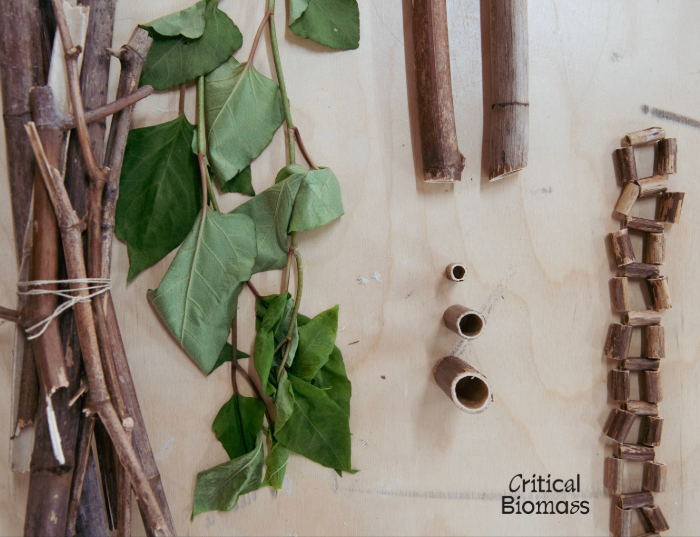[MASTERCLASS] Fiber Values: Understanding Classifications of Natural Fibers beyond Monoculture

Working with a variety of fibers in biomaterial production
When we look into more diverse fields and ecosystem approaches, we are forced to look into resources as unpredictable and diverse. There is no monoculture biomass resource available in these cases, so on what terms do we make classifications? Let's try to look into various forms of fiber lengths to classify our resources.
Overview
This masterclass opens up the knowledge of fibers and bio production based on the qualitative attributes of fibers from different origins.
Next, we dive into the production of materials based on long and short fibers. Composite versus filaments. Solid versus flexible. Biodegradability versus strength.
And what if we prospect a field based on a mapping that covers species, but also energy, installations and human and non-human interaction? We deduct our production process from what is available and locally sourced.
We learn about attributes and effects of production, binders, diversifying of fibers and open source production manners.
What to Expect?
The masterclass of 2 days holds 4 workshops. Jesse Howard, our project lead for Critical Biomass, will lead participants through this two-day experience.
1. Methodological framework introduction
(detailed workshop descriptions will be published soon)
2. Exploring long fibers with Anneleen Bertels
Knotting Fibers Together / Knotting Many Loose Threads Together
Anneleen conducted a 3 months research in Japan in 2023 on textile crafts of Bashofu, Kurume Kasuri and other Japanese natural fibers. Both in Bashofu textiles and Kasuri textiles, knotting techniques are applied on the fibers and are essential for the particular outcome of the woven textiles.
Bashōfu is a representative Okinawan textile made from the natural fibers of the ito-basho plant (family of the bananatree), which is found mainly in the subtropics.
Sōetsu Yanagi, Japanese art critic and founder of the mingei (folk craft) movement in Japan, praised Bashōfu for being one of the most sublime natural fabrics because the practice of dyeing, weaving, and agriculture act as one.
After extracting the fibers from the stalks, they are joined together with a weaver’s knot to make one continuous thread. The beauty of the woven textile is expressed through the multiple knots that are necessary to join the individual fibers. They create a refined and particular texture.
During this masterclass we will look into the making process of banana fibers and take inspiration to apply the same knotting technique on other local natural fibers. Or what if we invent new knotting techniques? And how could we connect leftover fibers together, to then create ropes?
3. Exploring medium fibers with Barbara Mydlak
The Future of Paper Made From Plant Waste
Participants will learn how to process plant waste (e.g., stems, leaves, bark) into pulp suitable for papermaking. Preparation techniques including: soaking, cooking, and beating of fibers and safe handling of potentially toxic plant species during processing.
The workshop also covers topics such as the retention of pigment in plant material, optimal storage conditions for preserving handmade paper from different fiber sources (humidity, light, temperature, pH). Comparative biodegradability and longevity of papers depending on plant species and processing method, as well as the role of handmade paper in sustainable art, design and long-term material resilience.
Designed for anyone interested in sustainable practices, artists, designers, and researchers. The workshop bridges traditional crafts, material science with creative practice.
Please note: As the papermaking process involves working with water, participants are kindly requested to wear appropriate work clothing, disposable gloves and waterproof aprons.
4. Exploring short fibers with Mahe Plancke
3D Printing with Biomaterials
This workshop offers an introduction to 3D printing with biomaterials, focusing on how fiber length — short versus long — shapes the structure and performance of printed parts. We will work with fibers derived from Japanese knotweed, an invasive plant species repurposed as a sustainable material source.
Through a mix of discussion and hands-on practice, the workshop will cover fiber processing, recipe preparation, and printer adjustments needed for working with bio-based paste to 3D print. In this workshop we will learn to prepare and print with both short and long fiber blends, exploring how each affects print resolution, strength, and recipe composition.
The workshop encourages critical engagement with material sourcing and investigates how invasive species can be redirected toward regenerative design and responsible fabrication.
Please note: Protective masks (for small particles like dust), gloves and aprons are recommended during material handling.
Practical Info
- Date: June 27-28, 2025
- Time: 09:30 – 17:00
- Location: Timelab, Kogelstraat 34, 9000 Gent
- Registration: Mandatory
- Fee: €800 (incl. VAT, incl. 2x lunch and 1x dinner)
- Language: English & Dutch
Who is it for?
Professionals and anyone who is interested in working with biomaterial in design. Knowledge of biochemical, industrial processes of design and production methods will come in handy, but is not a must.
Sign up
We only have a limited number of spots! Sign up in time.
Questions? Feel free to reach out to us at team@timelab.org.
Critical Biomass
This event is part of our public program, shaped by the ongoing journey of Critical Biomass. Curious to see where it leads next? Come join us for more moments like this!
[WORKSHOP] 7th of June - Living Organisms in Material Production - by Lara Campos
[MASTERCLASS] Fiber Values: Understanding Classifications of Natural Fibers beyond Monoculture
[DEBATE] Rethinking Bio Waste – Embracing Uncertainty in Local Biomaterial Production with Eugenia Morpurgo, Fibershed Belgium, BC Materials
[BOOK BRUNCH] "Fieldwork for Future Ecologies" (2022) - with Tique art space for books
[EXCURSION] Loos-en-Gohelle (France)
[SUMMERCAMP] Fiber Fever 2025: Dialogues